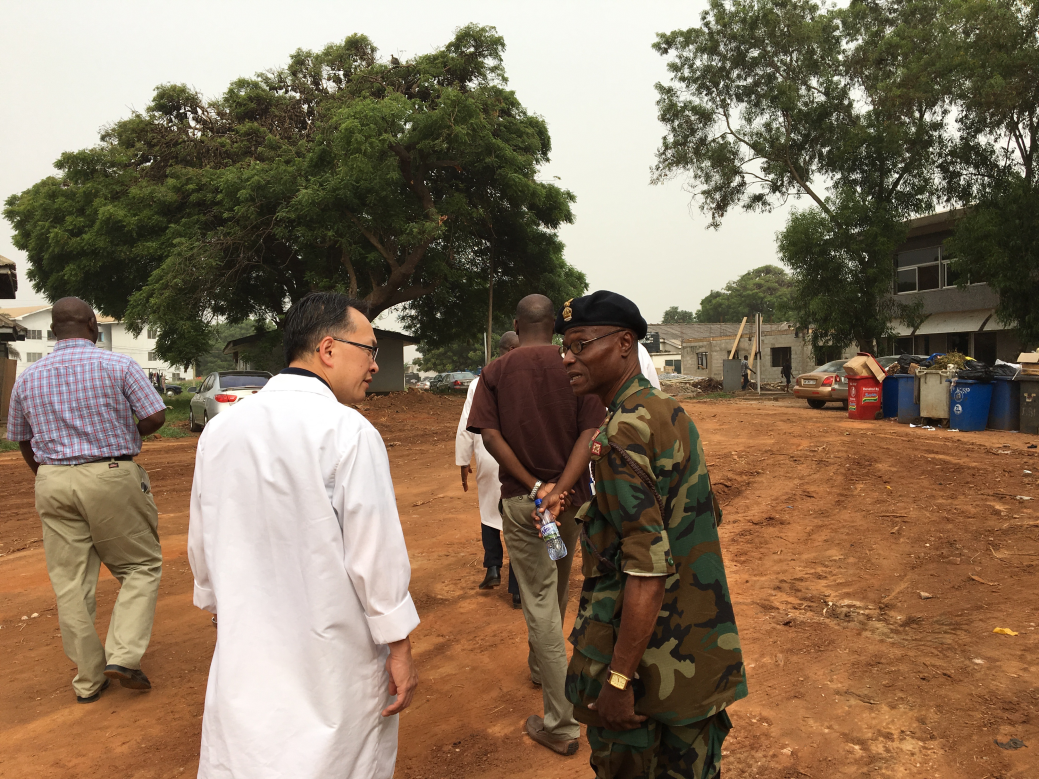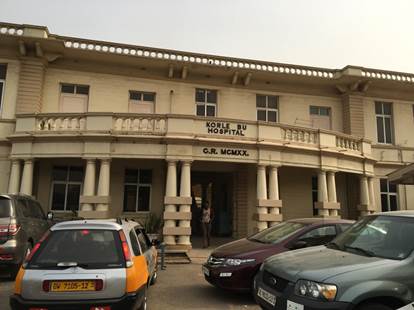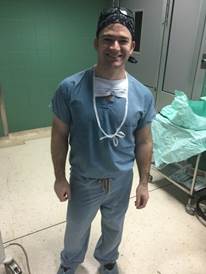The following article is adopted from Urology's weekly newsletter, What's New.
1. Dr. John Park
A few years ago, we envisioned a Michigan-Ghana educational collaborative mission project. The primary goal of this one week annual trip was to help provide modern urologic care unavailable in Ghana, teach Ghanaian urologists complex reconstruction and modern endourology techniques, increase access for our faculty and trainees to the complex clinical problems that are becoming rare in the US (such as bladder exstropy and massive BPH), provide unique “service” experience for Michigan residents/fellows, and help the Ghanaian urologists improve their overall clinical care quality. The first Michigan trip was in December 2012 (Atiemo, Faerber and Park) where we developed the initial 5-year plan for an educational collaborative. In November 2013, Atiemo and Faerber, along with the senior resident Casey Dauw, participated in a week long urological surgery workshop for the Pan-Africa Urological Surgery Association (PAUSA) that included endourology and other complex reconstructions with live case demonstrations and lectures. We did not travel to Ghana in 2014 due to the Ebola outbreak scare in West Africa (fortunately, there were no reported cases of Ebola in Ghana). For 2015, the original team consisted of Humphrey Atiemo (formerly of UM, now at the Henry Ford Hospital. A Ghanaian himself, he has been a wonderful connector and liaison for our trips), Faerber, Park, Scott Van Appledorn (Carl’s son) and Ryan Swearingen (4thyear resident). Unfortunately, Scott and Gary did not make the trip due to personal reasons.
The last time I traveled to Ghana was 3 years ago, and I had anticipated that we would be very busy by simply showing up. I had thought that it would be similar to when Jim Montie, Stu Wolf and I used to travel to Haiti. I was bit disappointed that we were not busier. We had hoped to do at least 23-24 cases, but ended up doing only about 11 total during 5 days. Although these cases were meaningful (and challenging), it was clear that in order to maximize our time there, we needed to plan and communicate better with our host urologists in Ghana.
I was once again impressed by the core values of excellence and professionalism of the Ghana urology faculty in Accra. They are outstanding clinicians who are committed to improving the care for Ghanaians and to training the future generation of Ghana urologists – a shared trait with our Michigan Urology’s core mission.
A few impressions:
1. Unlike other humanitarian mission trips like Haiti where there is absolutely no urology care, Ghana’s urologic resource and capability are quite sophisticated. And it must be planned in the context of the entire hospital’s day-to-day work. We realized that we had to work within their surgical “block” time and work with the typical nuances of OR logistics that we deal with here in the US (including even more thorough pre-induction verification and pre-incision time outs). Planning a trip to Ghana should be like setting up an actual continuing medical education course with specific learning objectives. For instance, focusing on a specific clinical topic (such as laparoscopic surgery or incontinence pelvic surgery) and recruiting patients to achieve the educational goals should drive how to construct the week’s schedule, rather than simply showing up for whatever problems that may await us.
2. Patient- and family-centered care matters in Ghana too. December was artificially chosen by us, but it turned out that it was one of the worst times for the patients and families. There is no outpatient or short stay surgery in Ghana. Patients have to travel long distances and need to stay in-patient for a few weeks for surgery and recovery. December is a family time around Christmas, so many patients were reluctant to come in for elective surgeries. January will be better.
3. Resident roles need to be defined better. From the Ghana urology faculty and residents’ perspective, they welcome us as their mentors. Some of the routine cases for our residents (such as simple pelvic stone laser lithotripsy) is a valuable hands-on learning experience for them, whereas some of their ‘routine’ cases (such as open suprapubic prostatectomy for BPH larger than 200+ grams or perineal urethroplasty for membranous stricture) would be an awesome experience for our residents to learn directly from their faculty. The experience can be a win-win.
4. I came away thrilled that our core values and mutual goals between us and Ghana urology faculty at the Korlebu and 37 Military Hospitals are well aligned, and this bodes well for the future of this mission.
5. What we get out of this service work are:
a. Satisfy our innate desire to serve the under-privileged and improve the urologic care around the world
b. Increase access to complex clinical problems becoming rare in the US
c. Create unique adventure opportunity for our residents to experience practicing medicine in developing countries, which will be an attractive strategic feature of our resident recruitment strategy
d. Expand the University of Michigan urology brand around the world, especially in the economically up-and coming countries such as Ghana
What the Ghana urologists get out of our visits are:
a. Increase the Ghana urologic capability in order to better serve the population – their goal is to improve so that Ghanaians do not have to leave the country.
b. Learn academic skills to collect and study the outcome data.
Here is a great write up from Ryan, describing our recent trip, and I hope you enjoy reading it. My major goal for the next trip – tentatively planning for January 2017 – is to have this mission become fully funded by philanthropy and partnership with industry, and plan it with specific learning objectives to achieve our stated goals mentioned above.
2. Dr. Ryan Swearingen
In December of this past year, I was fortunate enough to go to Accra, Ghana with Dr.’s Park and Atiemo. This was an area I knew little about, but I had heard excellent things about the trip from Casey two years ago, and was excited for the opportunity to explore a new country. I was also extremely interested to see what the operative experience in Ghana would be like. This is the third time that our group from Michigan has gone, and the first in two years given the concerns with Ebola last year.

I did not touch any bats or monkeys.
We landed in a crowded and hot airport in Accra, Ghana early on Sunday morning to start our week after flying for about 14 hours. We had the chance to visit Dr. Atiemo’s parents’ home in Ghana, as well as to drive around the city a little before arriving at the hotel. Large, brand new buildings were intermittently sandwiched between areas of poverty. Random cattle and livestock intermittently would cross the road, diverting traffic around them. It was a little different than driving back to Ann Arbor from Detroit.

Outside the airport in Accra, Ghana

Side street, animals walking adjacent to our vehicle
The next day, we headed in to 37 Military Hospital, which is the Ghanaian version of a VA hospital. The hospital was spread out in military style barracks, and we walked from ward to ward to the operating room all outside. The OR itself was fairly modern, and similar to U of M. Dr. Park was able to do a number of hypospadias cases, while Dr. Atiemo and I tackled stones during our days here.

Dr. Park operating at 37 Military Hospital

Dr. Park and Dr. Mante, one of the Urologists and administrators at Military 37 Hospital.
Bats have nested in the trees outside the hospital, so the sky was completely covered in bats flying in every direction as we went from building to building. This seems like an odd thing to point out, but it was very constant and hard not to stare at when walking from building to building.

Korle Bu hospital was where we would spend our other two operative days starting on that Tuesday, and was the area teaching hospital. This is the main hospital in the area with residents and medical students, who worked and operated with us during our week. The hospital was still sprawled out over a huge area, and similar ward-style rooms with patients lined up in rows without doors or any barriers. Patient privacy did not seem to be an issue at all.


GU ward at Korle Bu Teaching Hospital. No private rooms, no air conditioning.
In terms of the patients we saw and treated, they tended to present much later with more advanced issues, deciding instead to wait or try alternative therapies with herbal remedies, etc, prior to coming in to the hospital given both the difficulties of travel and cost. We had a bladder exstrophy patient (something I’ve never seen here in the US) that Dr. Park repaired, who came in at age 13!

In the OR. Lots of spectators
One thing that I found very interesting was that despite many citizens having health insurance, it typically covered almost nothing in terms of treatment. For example, if you came in with pyelonephritis, you would possibly get a bed in the hospital and be seen by a doctor. After that, your family would need to physically go buy whatever antibiotics, IV fluids, or any other materials you may need during the hospital stay, and then bring these items to the hospital for use. If you can’t pay, you wait in a bed until your family can come up with the money. The M&M conference we went to was very sad, with a number of patients having mortality and morbidity simply because the family could not pay for the needed treatment.
Operatively, things were both similar and different. The patient is brought to the OR, intubated, and only then do the nurses begin to set up the material needed for the case. Ureteroscopy was similar in that we used a video scope, the scope was essentially an older version of what we have, and many of the other instruments were similar. However, after doing a number of endoscopy cases, I can say I am extremely thankful for pressure bags, scope nipples that don’t leak, laser machines that have more than 8 watts of power, and waterproof gowns (you don’t know what you miss until it’s gone). Also, air conditioning in the OR.

Post ureteroscopy
In terms of the rest of the Ghana experience, there is so much more I could say, but I don’t want to drone on and on. We were fortunate to have Dr. Atiemo steer us in terms of food and travel choices, and we had the opportunity to eat a number of local dishes.

This is called “fufu”. It’s soup, with chicken and a pounded paste-like polenta made out of cassava and plantains. You basically need to take a nap after eating this, as we were advised several times that dinner was way too late to be eating something this heavy.
We also got to enjoy Casey’s favorite “shito sauce”, which is basically the Ghanaen hot sauce that had Dr. Park and I sweating (again) on a number of occasions. I did bring some back with me, and am waiting for a good conference dinner to crack it open on a Tuesday.
Overall, the trip was an amazing experience and a wonderful opportunity. I think it’s a great outreach program for our university, and I highly suggest it to any interested residents in the future.


